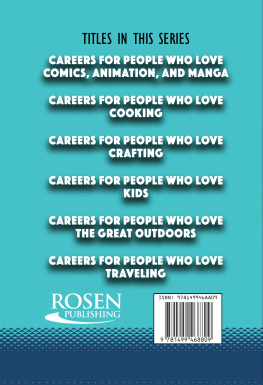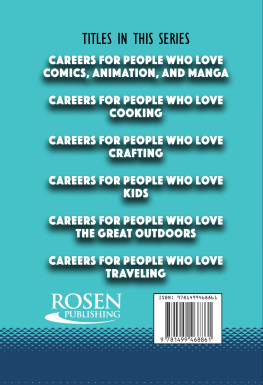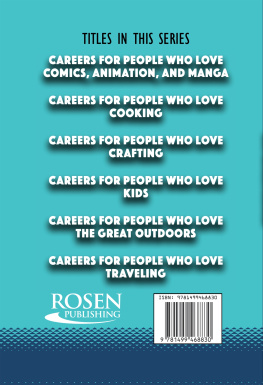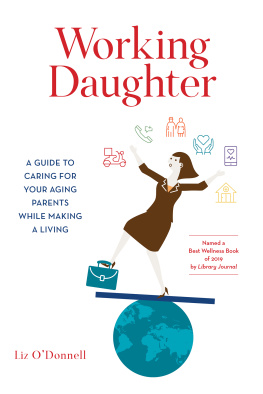
Published in 2021 by The Rosen Publishing Group, Inc.
29 East 21st Street, New York, NY 10010
Copyright 2021 by The Rosen Publishing Group, Inc.
First Edition
Portions of this work were originally authored by Harriet Webster and published as Cool Careers Without College for People Who Love to Work with Children. All new material in this edition authored by Morgan Williams.
All rights reserved. No part of this book may be reproduced in any form without permission in writing from the publisher, except by a reviewer.
Library of Congress Cataloging-in-Publication Data
Names: Williams, Morgan.
Title: Careers for people who love kids / Morgan Williams.
Description: New York: Rosen Publishing, 2021. | Series: Cool careers
without college | Includes bibliographical references and index.
Identifiers: ISBN 9781499468793 (pbk.) | ISBN 9781499468809 (library bound)
Subjects: LCSH: Vocational guidance--Juvenile literature. |
Child care--Vocational guidance--Juvenile literature. | Coaching
(Athletics)--Vocational guidance--Juvenile literature.
Classification: LCC HF5381.2 W551 2021 | DDC 649.02373--dc23
Some of the images in this book illustrate individuals who are models. The depictions do not imply actual situations or events.
Manufactured in the United States of America

CONTENTS
INTRODUCTION
I t takes a special person to work with children on a daily basis. Most people who do are passionate about helping the next generation learn, develop, and adapt. From day care workers to school bus drivers, the adults who interact with children have the ability to affect their lives and put them on a path toward future success.
Jobs that involve interacting with and taking care of children every day come with their own sets of advantages and challenges. The most obvious benefit to pursuing a career in this field is that youll be getting paid to influence the next generation. The most obvious difficulty is that some kids can be rowdy and disrespectful to someone in charge and that could be you. However, if youre interested in making working with children your career, the positives far outweigh the potential negatives of most of these jobs.
There are more job opportunities than you might think if youre interested in working with kids, and not all of them require an advanced education. You may already have experience babysitting, and moving on to full-time childcare positions will be easy. If youre an artist, you might be surprised at how eager children are to learn your skillsand how much parents are willing to pay a good enrichment instructor. Sports fanatics dont have to worry, eitheryouth coaching is not only alive and well, its becoming even more popular as parents want their kids to be healthy and happy.
While you cant become a teacher without a college degree, becoming a teachers assistant is an attractive career path for many who want to help teach kids. If you want to be involved in schools but cant see yourself in the classroom, a career as a school secretary could be just what youre looking for.
There are endless opportunities available if youre willing to work for them. As long as you have a love of children, a good work ethic, and the desire to learn, theres no doubt youll be able to find a career that involves working with kids.
CHAPTER 1
TAKING CARE
C hildcare is one of the most important businesses in the world. Many parents need to work, and few families are wealthy enough to afford a private, in-home babysitter or nanny every day. If you enjoy spending time with children, encouraging their play, sparking their creativity and learning, and think you could find satisfaction working with kids, a job in the childcare industry may be the right career move for you.
THE MANY FORMS OF CHILDCARE
Childcare workers can be employed in a wide variety of settings. Some care for children in the childs home. Others work at a day care center or in the home of another caregiver. About 25 percent of childcare workers are self-employed, taking care of children in their own homes. No matter the setting, there are few jobs more important than taking care of the needs of children while their parents are at work.

A lot of teenagers get great childcare experience by babysitting on evenings or weekends.
If youve ever earned extra money working as a babysitter, youve already experienced a job as a childcare worker. Your primary responsibility in this role is keeping the child (or children) safe and happy in your care. As a childcare worker, youll spend much of your day taking care of childrens basic needs, which may include preparing and serving nutritious snacks and meals, helping them dress, helping them stay clean and healthy, and making sure they get enough rest.
Some childcare workers specialize in infant care. Theyre familiar with a babys needs and know how to comfort an infant who is distressed. These specialist workers must also have enormous patience and the ability to stay calm under stress. When an infant wont nap or cries for long periods of time, infant care providers must stay composed. They prepare bottles and change diapers. They know how to hold a baby properly, and theyre knowledgeable about which positions an infant should sleep in. Most of all, the best childcare workers in infant care are those who truly enjoy tending to babies.
TAKING ON AN IMPORTANT ROLE
Its very important that childcare workers enjoy children and take pleasure in caring for them. Because of the long periods of time they spend with children every day, they have a significant effect on the childrens development. A good childcare worker recognizes that part of their job is to encourage childrens intellectual, social, and emotional development. Instead of sitting children in front of a TV for extended periods, a good childcare worker plays games with them, reads books to them, takes them out for walks, initiates arts and crafts projects, and helps them master basic skills, such as zipping up a jacket or catching a ball. Childcare workers who are responsible for more than one child also need to teach children how to get along with others, and they need to understand how to settle conflicts between children as well.

Taking care of childrenespecially in groupsis more than just fun and games. Youll also teach them valuable life lessons.
A competent caregiver respects the value of play in childrens lives. They know that building with blocks and completing puzzles are ways to introduce a child to basic math and problem-solving concepts. Similarly, making up stories, playing dress up, or producing an elaborate tea party, complete with stuffed animal guests, are all ways to stimulate language and social growth.
Another important part of a childcare workers job is to communicate regularly and effectively with the childs parents. Parents need to hear about any problems that crop up while the child is in day care. They need to be informed about the childs accomplishments and fears, as well as any behavioral issues that arise. If you work in a day care center, there will probably be a set of rules or guidelines that specify how to communicate with parents. For example, the center may send a notebook home with the child each day, in which the childcare worker notes any particular problems or developments in the childs daily life. The parents may be encouraged to write back with their comments, concerns, or questions. At other centers, parents and caretakers sit down together at regular intervals, likely weekly or monthly, to discuss the child and their development.
Next page















